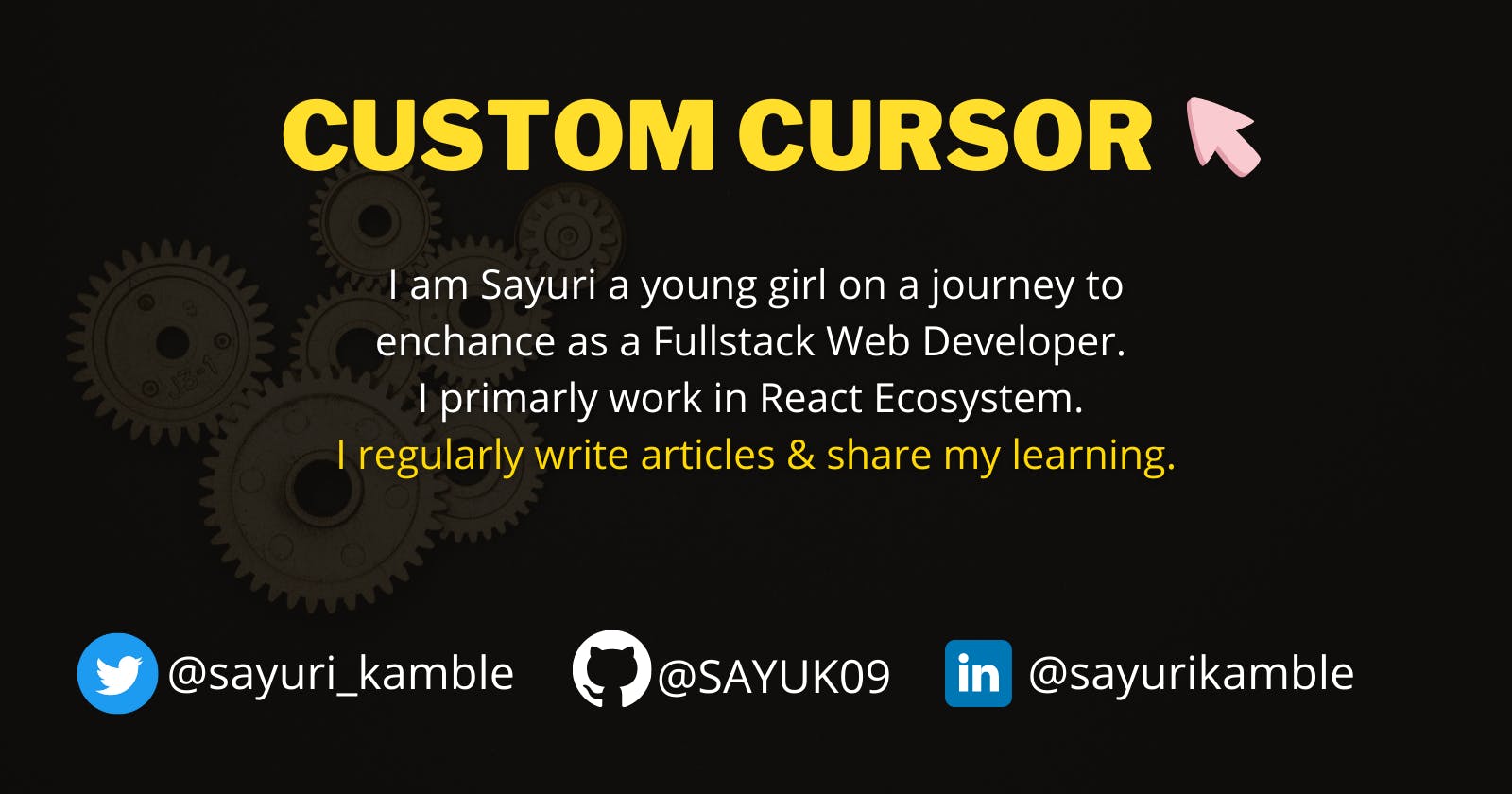Here's some context before we start.
Got inspired to customise the typical cursor we all use. Googled, researched, watched videos but found nothing worthwhile.
So here's an article on building your own fancy cursor.
Here's what we are building today.
Let's Begin:
Here's the overview:
- The fancy cursor you see above is nothing but 2
divs styled in a way to appear like a ring & a dot. - Track the position of the original cursor.
- Displace your customised cursor as per the position of the original cursor.
- And finally, hide the original cursor.
Yes, it is that simple.
The CustomCursor Component:
Reverse Engineering it.
We will be importing our CustomCursor Component in the app.js in the following manner:
import "./App.css";
import CustomCursor from "./components/customCursor";
function App() {
return (
<div className="App">
<CustomCursor />
{/* Rest of your code */}
</div>
);
}
export default App;
Now, let's build our component.
Track the position:
Firstly, we need to track the position of our original cursor and hence we will displace our custom cursor with respect to the position tracked.
- Use the
mousemoveevent listener to grab x & y co-ordinates of the original cursor. Store them in a state variable using
useState. Here we are naming itposition.const [position, setPosition] = useState({ x: 0, y: 0 }); useEffect(() => { document.addEventListener("mousemove", (event) => { const { clientX, clientY } = event; setPosition({ x: clientX, y: clientY }); }) })
clientX & clientY are the X & Y Position Coordinates extracted from event
Tip: console.log to check if you are able to access the co-ordinates
Build a Basic Custom Cursor:
- Create a
div(will style it as desired later). - Displace it using the
positionstate variable(extracted from the event listener above).- To move the
divaround we'll usetop&leftCSS properties combined withposition:fixed position:fixedwill remove thedivfrom the normal document flow.
- To move the
<div style={{ left: position.x, top: position.y, position:fixed}}>
Cursor
</div>
Put the pieces together and you'll get a cursor like this 👇
Basic Custom Cursor - Watch Video
That's some good progress. Let's keep going.
Style the Custom Cursor:
It's time to beautify our cursor. Use all of your creativity and design a fancy cursor.
I'll just be styling the divs to appear like a ring & dot
Here's how the jsx looks like.
<div className="cursor ring" style={{ left: position.x, top: position.y }} />
<div className="cursor dot" style={{ left: position.x, top: position.y }} />
And here's the CSS styling.
.cursor {
position: fixed;
}
.ring {
width: 22px;
height: 22px;
border: 2px solid rgba(165, 160, 160, 0.808);
border-radius: 100%;
transform: translate(-50%, -50%);
-webkit-transition-duration: 100ms;
transition-duration: 100ms;
-webkit-transition-timing-function: ease-out;
transition-timing-function: ease-out;
will-change: width, height, transform, border;
z-index: 999;
}
.dot {
width: 8px;
height: 8px;
background-color: rgb(100, 94, 94);
border-radius: 100%;
transform: translate(-50%, -50%);
z-index: 999;
pointer-events: none;
transition-duration: 10ms;
-webkit-transform: translate(-50%, -50%);
-moz-transform: translate(-50%, -50%);
-ms-transform: translate(-50%, -50%);
-o-transform: translate(-50%, -50%);
}
And there we are! We have a beautiful custom cursor followed by the original cursor.
Custom Cursor
Hide the Original Cursor
We are almost done.
We just have to hide the original cursor.
It's quite simple. Here's how we do it.
html {
cursor: none;
}
That's all! We are done.
Now you can see a beautifully customized cursor with a smooth transition.
Here's the code altogether.
function CustomCursor() {
const [position, setPosition] = useState({ x: 0, y: 0 });
useEffect(() => {
document.addEventListener("mousemove", (event) => {
const { clientX, clientY } = event;
setPosition({ x: clientX, y: clientY });
});
}, []);
return (
<>
<div className="cursor ring" style={{ left: position.x, top: position.y }}/>
<div className="cursor dot" style={{ left: position.x, top: position.y }}/>
</>
);
}
Hope you found this valuable.
A huge shoutout to my friend Udit , The customised cursor on his portfolio got me inspired to build one.
PS: Don't just stop here, as you now know the technique go ahead and use your creativity to the fullest to design a fancy cursor.
Tip: Try adding animations on the click of the mouse.
That's it from my side today. Let me know your thoughts in the comment section.
If you liked the article give it a thumbs up.
Hope you enjoyed it, and if you did, consider supporting me 👇. It will make my day :)


